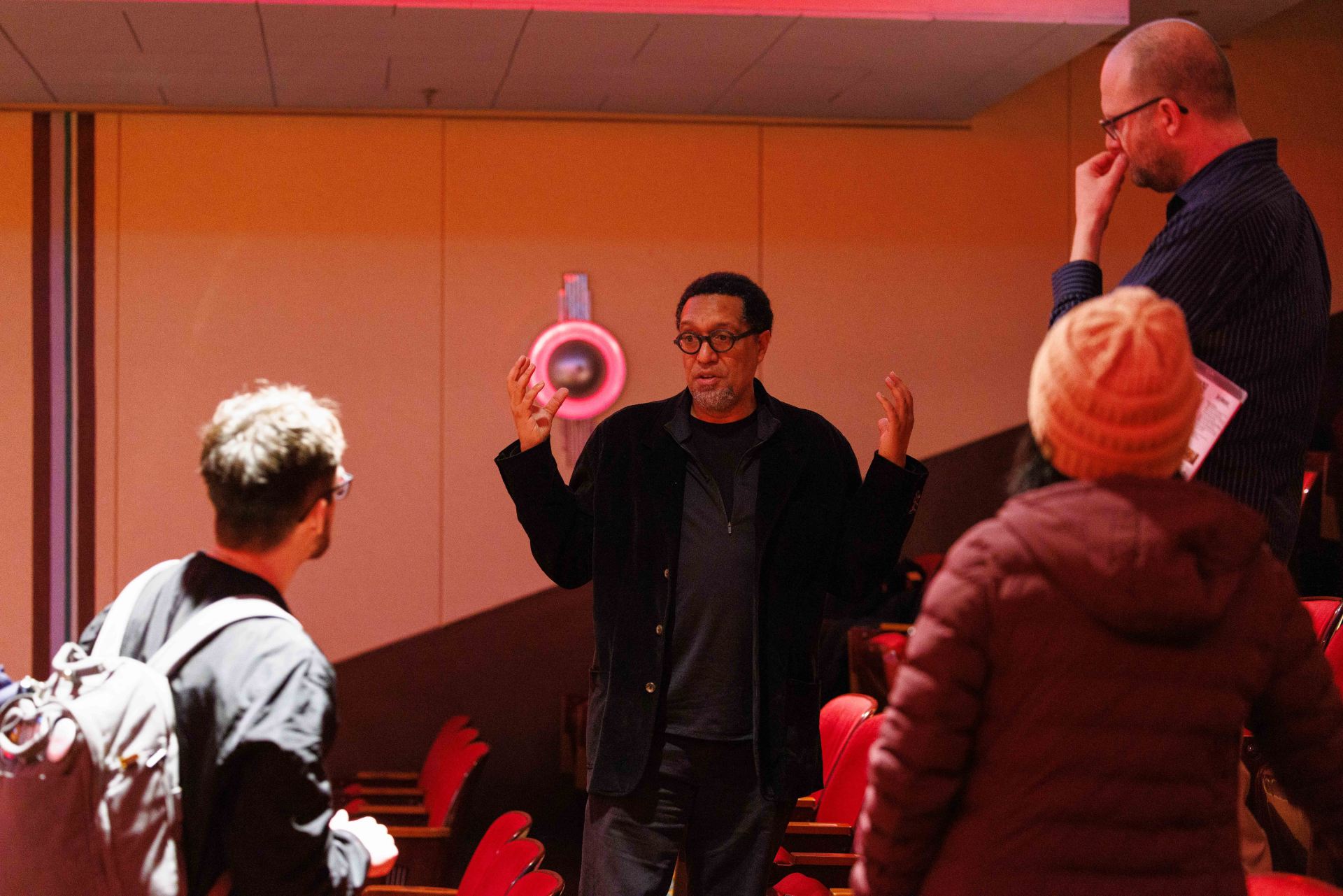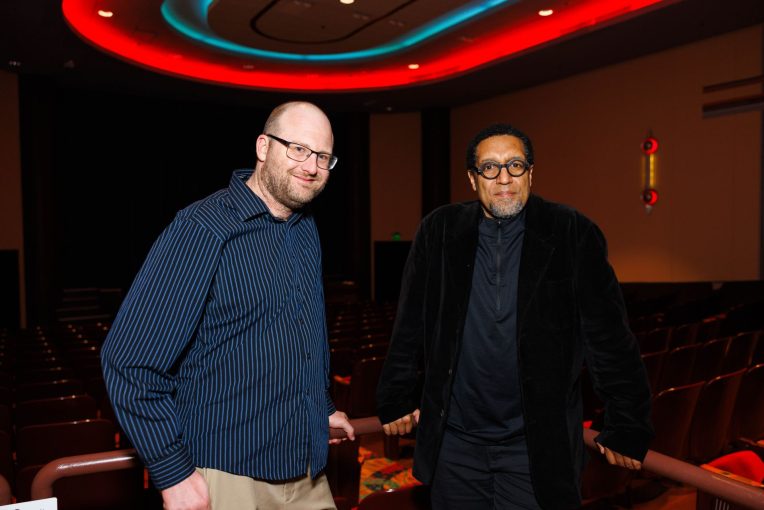Blaxploitation films from the 1970s are the focus of an Honors Exploration and public film series led this semester by Dr. Stanford Carpenter and Dr. Eric Wesselmann ’03, M.A. ’05.
After co-teaching their first Honors Exploration class together last fall, Exploring the EthnoGothic: Horror, Race, Social Identity, and Culture, Carpenter and Wesselmann are diving into Blaxploitation, a film genre that originated in the 1970s and featured Black characters fighting racist systems on their own terms.
Students who are enrolled in the five-week Honors Exploration course, Can You Dig It? Exploring Race, Representation, and Culture in Blaxploitation Films, will watch four films and a documentary that showcase the Blaxploitation era in the early 1970s including Sweet Sweetback’s Baadasssss Song, Shaft, Cleopatra Jones, Coffy, and David Walker’s Macked, Hammered, Slaughtered and Shafted. Four of the films are being shown at the Normal Theater and one at Moulton Hall throughout February.
“This is a controversial era in cinema. Although it increased representation, many argued (the films) were stereotypical,” said Wesselmann, a professor of psychology. “Scholars and fans have debated the pros and cons of these particular films, but that’s part of the center of the class—how it was experienced then with the sensibilities of the 70s and how it’s experienced now with modern sensibilities.”
“It’s a time in Hollywood where you had movies being made by Black people featuring Black people for Black audiences,” said Carpenter, chair of the Black & Brown Comix Arts Festival. “These were not mainstream films. These were Black independent films.”
Carpenter said that there’s more to these movies than just their heroic characters, but the era had an impact on representation for Black folks and people of color on- and off-screen due to an industry that was white-dominated with few Black directors, executives, and producers in film.
“(Blaxploitation films) gave opportunities for women and people of color that might not have had it. It set the stage for Black representation in mainstream film.”
Dr. Stanford Carpenter
“(Blaxploitation films) gave opportunities for women and people of color that might not have had it,” he said. “It set the stage for Black representation in mainstream film.”
Because the Blaxploitation era lasted less than six years, actors and creators at the time talked about different trends happening in Hollywood, said Wesselmann.
“They were typecasted in terms of the roles they could play and films they could do. The work dried up,” he said. “So many folks later in the 90s like Spike Lee, Ernest Dickerson, Mario Van Peebles—the son of Melvin Van Peebles—who created Black and African American centered films in the 90s were raised on Blaxploitation films.”
When Carpenter saw Wesselmann’s social media post about his Advanced Honors Seminar class in fall 2022, which included a discussion on the Ethnogothic, Carpenter initiated an exchange that later led the duo to co-teach in 2023. Carpenter was particularly interested because he and his colleague John Ira Jennings, a graphic novelist and professor at the University of California at Riverside, created the term “Ethnogothic” several years prior.

“Eric and I have a connection in terms of areas of common interest,” said Carpenter. “We revel in our intersections and in our differences. It’s cool to be able to have a co-teaching experience with another professor who you genuinely like and makes the learning and teaching fun.”
Wesselmann said he hopes his students and the community learn a couple of lessons from the series: Perspective in film is important and representation matters.
“Film, like any cultural product, is a product of its time,” said Wesselmann. “It’s important to have these cultural artifacts rather than erase them. It’s better to have trigger warnings and contextualization to help people understand where we were, where we are, and where we could go.”
Every Thursday from January 25 to February 22, during Black History Month, the series will screen these influential Black films.
Sweet Sweetback’s Baadasssss Song (1971)
January 25, 7 p.m., Normal Theater
According to Carpenter and Wesselmann, Sweet Sweetback’s Baadasssss Song is a film that created the Blaxploitation movement. Directed, written, and starring Melvin Van Peebles, is an epic tale of a mythological hero who comes from an impoverished background fighting for survival but becomes revolutionary and inspires the rest of his community to fight back against “the man.”
Shaft (1971)
February 1, 7 p.m., Normal Theater
Directed by the first Black director of a major Hollywood studio film, Gordon Parks’ Shaft is about a detective who is fighting the mob trying to prevent a race war in Harlem between the Black and Italian American communities.
Cleopatra Jones (1973)
February 8, 7 p.m., Moulton 210
U.S. special agent Cleopatra Jones is fighting against drug trafficking in her community and abroad. Carpenter said the film changed past perspectives on Black women because Jones is a superhero.
Coffy (1973)
February 15, 7 p.m., Normal Theater
Coffy follows the story of a nurse, who takes the law into her own hands to avenge her little sister’s hardship from drug addiction, engaging in a vigilante mission against the drug underworld. Coffy made the film’s star Pam Grier the first woman action film star of American cinema.
Macked, Hammered, Slaughtered and Shafted (2004)
February 22, 7 p.m., Normal Theater
Black actors like Jim Brown, Jamaa Fanaka, Rudy Ray Moore, Ron O’Neal, and Fred Williamson are a few who are featured in David Walker’s documentary that covers the Blaxploitation era in the 1970s.
The series’ last screening is a documentary directed and written by Walker, an author, filmmaker, and comic book writer, examining the Blaxploitation film movement in the 1970s featuring interviews with key filmmakers and actors and diving into the history of the genre. Walker will visit the Illinois State campus on Thursday, February 22, for the screening and a Q&A panel discussion at 7 p.m., Normal Theater.
The series begins its screenings on Thursday, January 25, and is open to the public. Tickets are available at the door and online ($7 general admission, $5 students).
The series is sponsored by the Black and Brown Comix Arts Festival, the Harold K. Sage Foundation, the Department of Psychology, the Foundation Fund, Wonsook Kim College of Fine Arts, NorCal MLK Foundation, and the Normal Theater.


